Territorians share their lawnmower love stories
IT IS the mower zone. Out there in the rain, grass troops on – mindless organic soldiers intent on strangling the precision of well-kept urbanity.
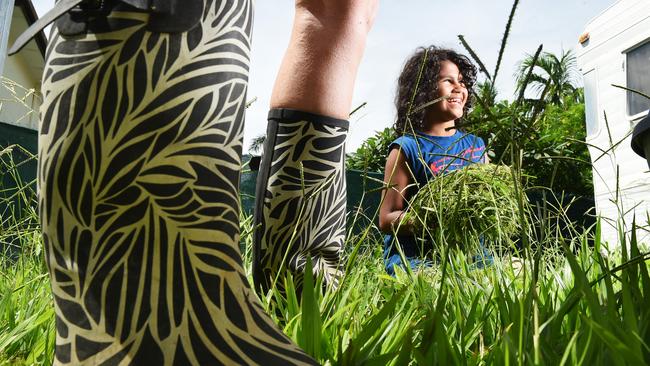
Northern Territory
Don't miss out on the headlines from Northern Territory. Followed categories will be added to My News.
IT IS the mower zone. Out there in the rain, grass troops on – mindless organic soldiers intent on strangling the precision of well-kept urbanity.
The Wet in Darwin brings with it the urgency of growth, nurtured by the heat and rain and is, perhaps, a metaphor for the people of the Territory, who refuse to be restrained by the choking southern values of the nanny state.
The lawnmower is the centrepiece of that war.
The Hall & Duck Trust is an organisation that preserves artefacts from lawnmower development and is a union of the private English collections of Andrew Hall and Mike Duck and that of lawnmower manufacturer Ransomes PLC.
The Trust tells the story of the illegitimate son of a yeoman farmer, Edwin Beard Budding of Stroud, who patented the first lawnmower in 1930. The patent for the machine was described as being for “the purpose of cropping or shearing the vegetable surface of Lawns, Grass Plats and Pleasure Grounds”.
Mr Budding is also credited with inventing the shifting spanner and he also designed a revolver, which he did not get a patent for.
Sydney-based science writer and author of The Lawn: A Social History Peter Macinnis said while Budding invented the lawnmower based on the machine used to trim the rough bits on cloth nap, it was not until the patent for his mower lapsed in 1855 and others began designing their own their use became widespread.
GALLERY: MOWERS OF THE TERRITORY
He said that led to the development of lawn tennis, the rise in popularity of croquet, and also gave rugby players a field to play on where there was no risk of falling face first into cow manure.
“Parks typically were full of animals – sheep, cattle, and I think George Washington had deer keeping his lawn going back to, I think, the 1870s,” Macinnis said.
“And inside (a stock fence) you’d have some colourful native servants cutting the grass with scythes. But you couldn’t get a true surface with scythes.
“So, if you are trying to play a sport with a small ball, you are going to have it skidding in all directions. They couldn’t have done that prior to the invention of the lawnmower because there would have been shit all over the place.”
His expanded thoughts were broadcast on Radio National in 2010.
“A huge number of lawn sports emerged within a year or so of 1859,” he said. “The first international cricket tour happened, several codes of football were established, croquet became popular and lawn tennis was first played in 1859.
“There was probably something else going on in the late 1850s, something related to muscular Christianity and the idea of a healthy mind in a healthy body. But sport would have been quite different, were it not for one thing.”
Sun Tzu, in The Art of War, states, “The greatest victory is that which requires no battle” – which we now know to mean: “Mow the grass while it is still short, so you must suffer less in the deadening Top End heat.”
Moweraholic rides on
AT TIMES, you could believe there is a need for Lawnmowers’ Anonymous in Darwin.
Virginian Alex Ford is one man who could stand up in front of a room full of people and say, “I’m Alex Ford – and I’m an moweraholic.”
“I like mowing,” he says. “I’m quite happy for that lawn to grow just as fast as it wants – and I’ve got a mate who likes mowing, too.
“He lives in town and he bought himself a ride-on. He goes around and he mows seven of his rellies’ places.
“I’ll be out late at night just watering the garden. Just pondering. Pondering life.”
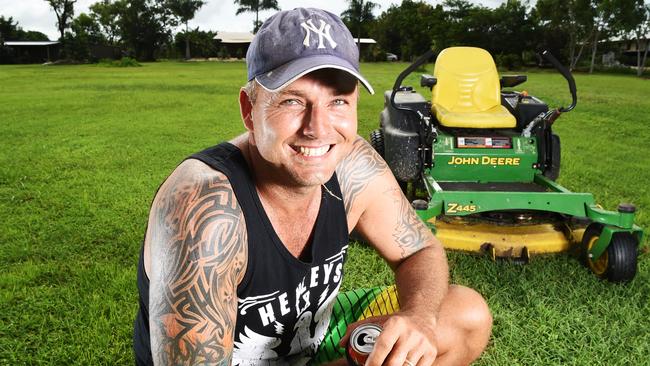
Alex is a builder and younger than I expect for someone with a fervour for mowing.
As we roll up, Alex is navigating his front yard on his John Deere Z445 ride-on, part of his 2.4ha block of which just 2ha is lawn.
“It is good therapy. Jump on it, and make your plans – that’s when I get all my good ideas, when I’m mowing,” he says.
In the Wet, he mows about three times a fortnight but he is always looking for his next mowing hit, even if it is depriving his partner, who also has a zeal for cutting grass.
“It’s overdue now,” he says, surveying his seemingly well-mown and manicured turf.
“She (his partner) wants to get on the mower. She wants to get on of a weekend but I’ve already mowed it.”
As we look out over Alex’s vast backyard, we reflect on other’s lives.
“Imagine (as a journalist) having to talk to politicians all day. You’d be better off mowing,” Alex says.
The drive to make golf perfect
MAYBE the forgotten equipment in golf is the grass.
At Darwin Golf Club, Scott Trembath is the course superintendent and he looks after a crew of seven operating 17 lawnmowers.
At this time of year, the 60ha course takes about 200 hours of mowing each week.
But each blade of grass is not the same –there is complexity there, with different mowers for greens, tees, fairways, roughs, light roughs, surrounds, and cutting heights varying from 3mm to 40mm.
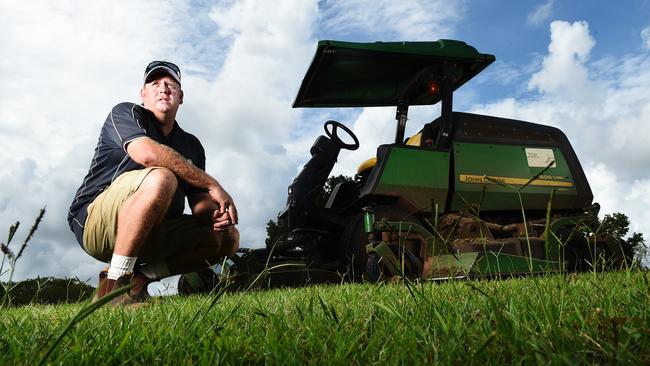
“The guys, that is basically what they do all day,” he says.
“It’s bums on seats, and they start at one end and by the time you are finished it’s time to go again. I enjoy cutting the roughs more, because you are not just going up and down in straight lines.
“I mow the greens, being a greenkeeper, and having only two other greenkeepers on staff – we’ve done (four year) apprenticeships – we are qualified to mow the greens.”
Of the mowers, the king is the $90,000 Toro Groundsmaster 4500 finishing mower, commanding that price because of its full-time, bi-directional four-wheel-drive and individual wheel brakes, five 69cm rotary cutting decks and a 60hp (44.7 kW) Kubota turbo-diesel engine.
“It leaves it like, you know, when you see a football or a soccer field (striped) – it has solid rear rollers on it that force the grass to roll over so the jobs looks complete and finished,” he said. “And that’s what you need on a golf course for the aesthetics of it all.”
Blowing aside the lush green
THE palms of Coconut Grove are flirted with by a teasing breeze as the heat returns from its exile by the monsoon.
And we find resident Garry Morris, shirtless with his gold chain, blowing away palm debris from his pavers secured behind a cyclone fence. “You could do it in your bathers if you wanted to,” he said.
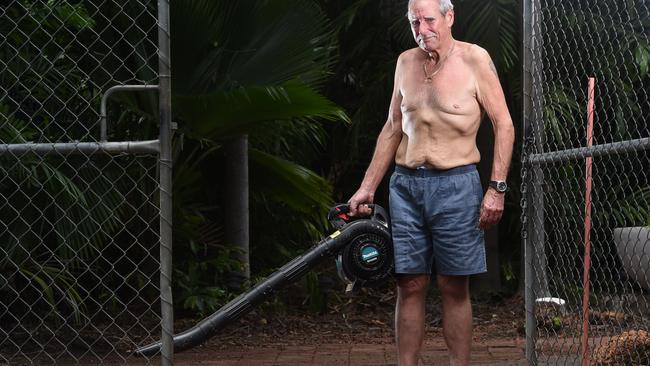
Mr Morris severed his relationship with grass long ago. And now the surrounds of his house are perhaps more as nature intended rather than lawn.
He came to the Territory in 1972, one of the stout pre-Tracy set.
It is humid but not too hot yet and as he poses for a photo and answers questions about his broken relationship with grass, he declines the offer to kill the mechanics of his blower saying: “It makes it harder to start when it’s hot.”
It could be a metaphor for Top Enders themselves.
“I’ve had to plant it (grass), dig it up, make gardens beds,” he said. “So you get fed up with a lot of it so you just turn it into palms.
“I have planted grass before, runners and seed, at a brand new house when I used to live in Malak.”
And the season we are now in became the genesis of Garry casting out grass from his life. “Wet season, you’d have to mow it three times a week if you’re lucky. If you could get to it. If not, it’s under water,” he said.
“It’s great (living with palms). I don’t have a problem. It cools the house down. You still get good breezes through. You have a shade.”
All that stands between Garry and no-mowing Nirvana is a recalcitrant gaggle of nut grass on his verge.
And as we walk away, the beast of the blower lives on.
Dodging the monsoon to get the job done
SHE mows to the caravan and back again. She mows to the caravan and back again in her zebra gumboots. Around the fig tree and the pool hoses and the random aluminium pole that stands useless, metal tits on a bull, in the yard.
The monsoon has wandered off to the Kimberley and the sun will soon be ours again.
Wanguri resident Georgina Wilson had three weeks away while the monsoon was home and had to borrow a contractor friend’s more industrial mower because hers hadn’t the stomach for the job presented to it.
The holiday grass.
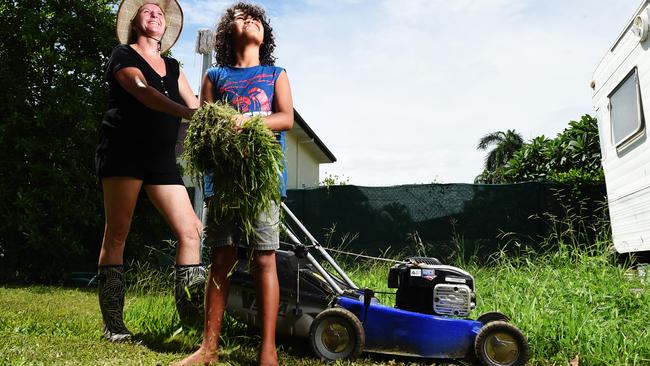
Ms Wilson is the widow of Warrumpi Band lead singer Yolngu man and rock icon George Rrurrambu, whose homeland of Elcho Island was adored by Neil Murray in the band’s song My Island Home.
“You know the length of time that it takes to get paint to dry in Darwin? Well, you can sit and literally watch the grass grow,” she says.
She rallies her nine-year-old son, Gigi Burarrwanga-Wilson, to accompany her mowing by playing on his acoustic guitar.
Sitting down after the photo-shoot but before the mowing is complete, Gigi says their seven-year-old chihuahua/miniature whippet-cross, Giz, is the street enforcer.
“He is the terrorist of the street – he owns the whole street,” he says.
Ms Wilson’s lawn is a rough melding of weeds and grass, but says she does enjoy mowing the lawn.
“But not when it’s over the top like this,” she says.
“It’s kind of therapeutic because you get the satisfaction of seeing the job done because, in Darwin, most things take forever to get done.
“(It’s) meditation more than anything else – or just mind- numbingly boring – and you just go to into the zone.”
She said Darwin Council regularly tried to fine her for not mowing her verge but she is not conceding responsibility, based on the principle of the council’s restriction of residential rights on the patch between the bitumen and rocks and a concrete hard place.
“You know after about $5000 worth of effort put into trying to keep it down I think I should get something back for my rates,”she said.
“Apparently it’s the ratepayer (who has responsibility for its maintenance) but I don’t own the verge.”
Happy to take a back seat in the yard
THE chooks faff about and forage and fight on the lawns. They consider the cut grass a convenience just for them.
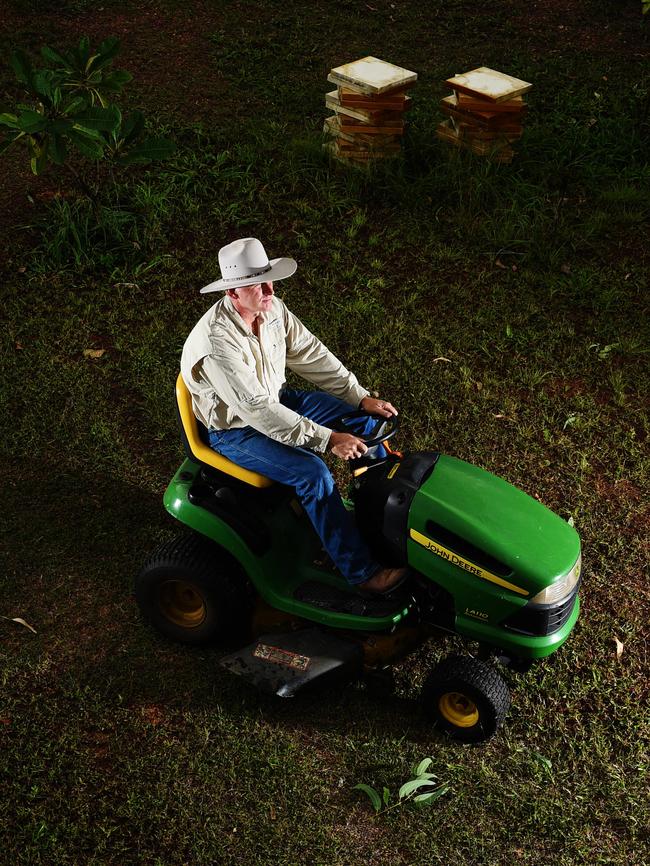
Firey Steve Sewell is in his blue jeans and splendid ten- gallon-style Akubra Bronco hat, by request for the photo.
He is neat and tucked in and friendly.
His family’s 8ha Acacia Hills block – they moved to escape the rat race of Humpty Doo – has Ringlock fences and cockies dropping down to drink from the bathtub horse trough of the buckskin mare and one-year-old male bay who likes to chew on the John Deere LA110 lawnmower.
There is an established garden with lawn around the newish home and Steve says it is normally his wife or his son that are cutting laps on the ride-on.
And he said, for him, lawnmowing is definitely a necessity rather than a passion.
“There’s a lot to do here so it’s definitely a once-a-week job that has to be done,” he said. “But it is a bit of a fight, it’s a bit of a passion for my wife Racquel, not for myself.
“She’s addicted.
“It’s not that she’ll own up to it but it’s a fight between her and my son to actually get on the lawnmower.
“It’s the closest he can get driving at this point in time.
“It’s something that I plan to do but it’s something that is normally done before I get around to doing it.”


